Celebrating Black History Month: History Made & History in the Making
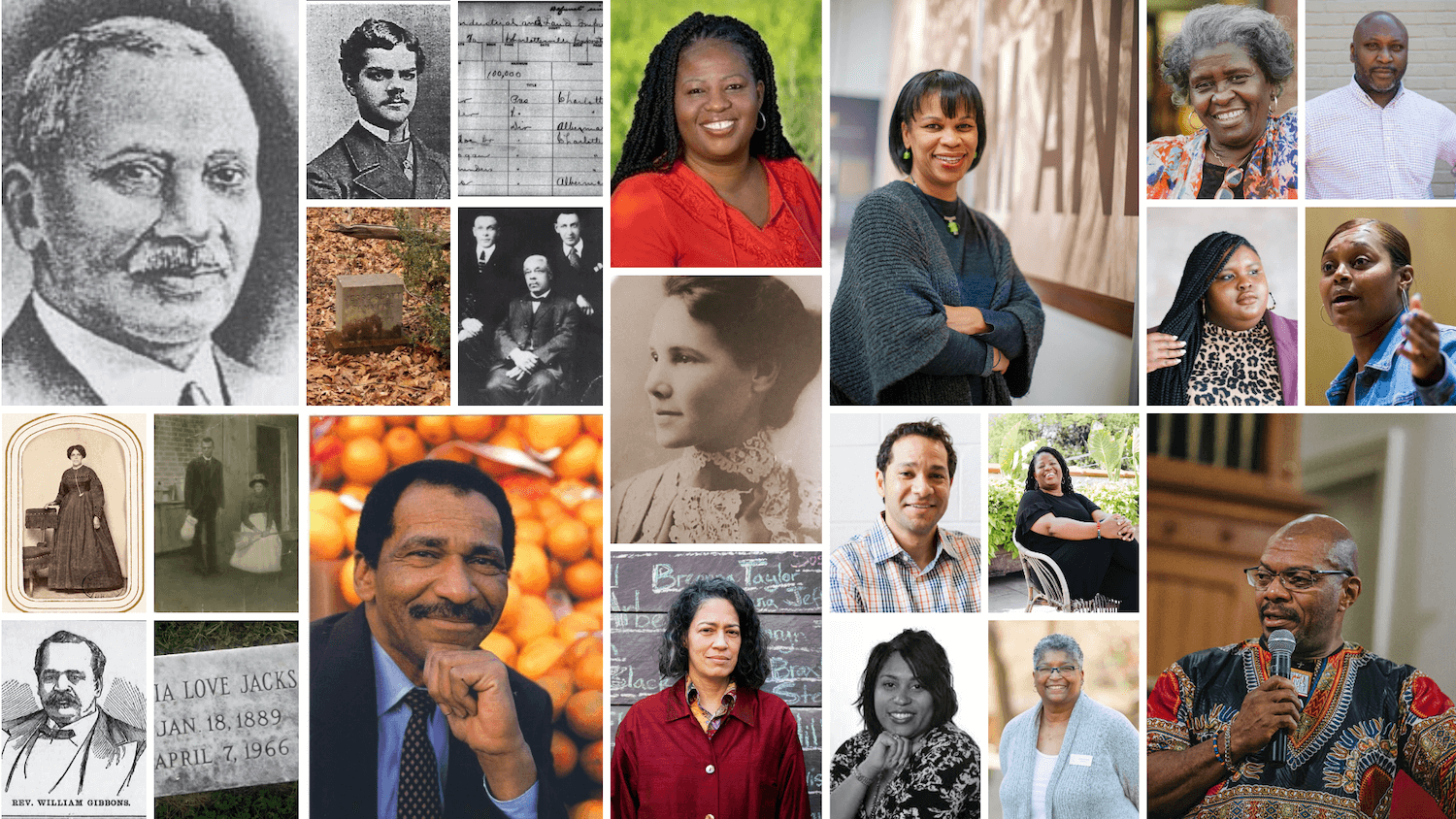
Charlottesville Black Professionals Who Have Made History & Those Who Are Making History Now
This year, Martin Horn celebrated Black History Month by profiling some of the most influential Black professionals in Charlottesville’s history, and Black professionals who are making history now.
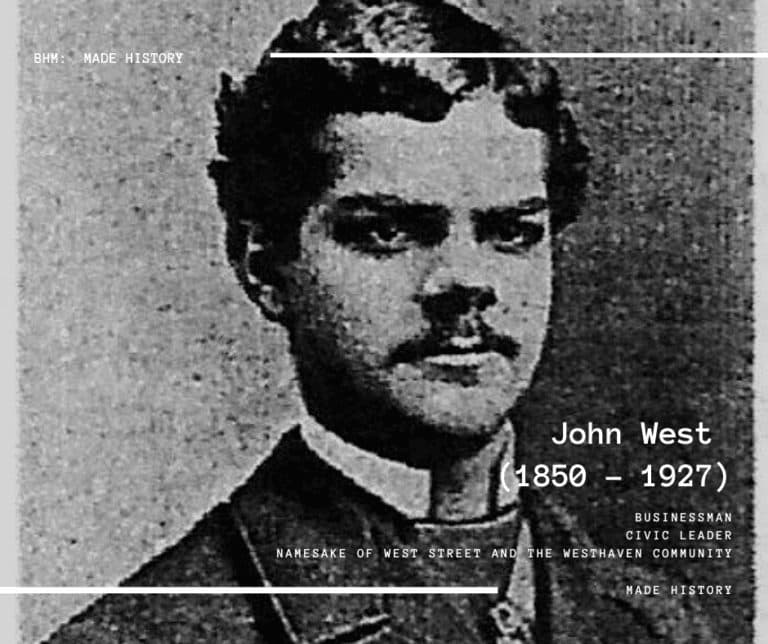
JOHN WEST
John West (c. 1849 or c. 1850 – July 25, 1927) was a prominent businessman and civic leader. He was born a slave in Charlottesville and freed at the end of the civil war. West Street and the Westhaven community are named in honor of John West.
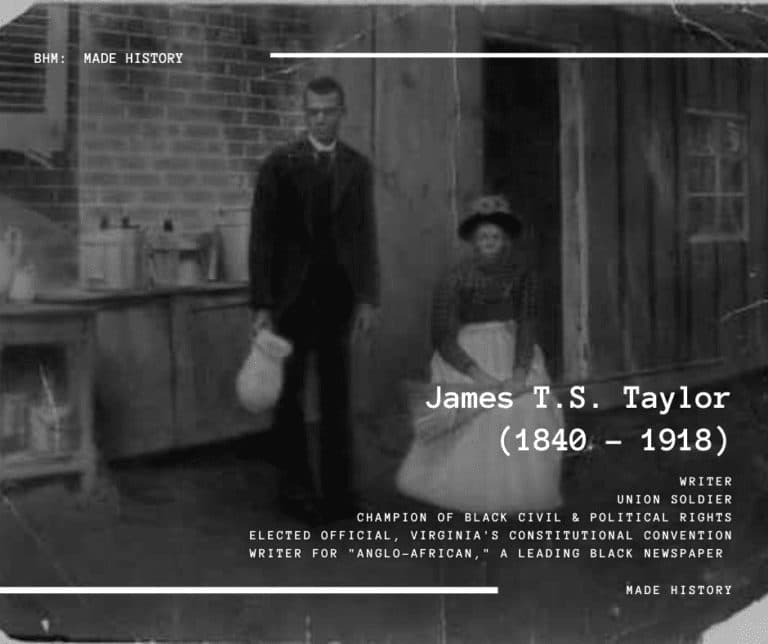
JAMES T.S. TAYLOR
James T. S. Taylor, Sr (1840–1918) was a prominent African-American businessman who represented Albemarle County at the Constitutional Convention of 1867–1868. Born to free parents, Taylor served with the United States Colored Troops (USCT) during the Civil War (1861–1865).
Taylor was the first African American elected to represent Albemarle County in the Virginia General Assembly and at a Virginia Constitutional Convention. A Republican, Taylor fought for universal manhood suffrage, the establishment of a statewide and racially integrated public school system, and more democratic local governments.
James T.S. Taylor was the only black man elected in Albemarle County during Reconstruction. He was born free in Berryville, Virginia and served in the Union army during the war. As Albemarle’s representative to the 1867-1868 Virginia Constitutional Convention, he participated in an unsuccessful vote for integrated public schools.
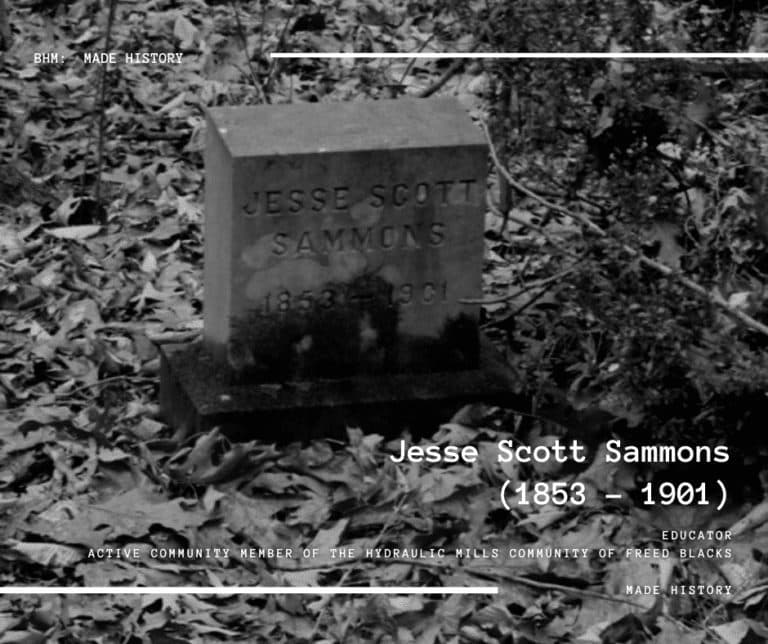
JESSE SCOTT SAMMONS
Jesse Scott Sammons (1853 – 1901) was a prominent African-American educator in the late 19th century and active in the Hydraulic Mills community of freed blacks.
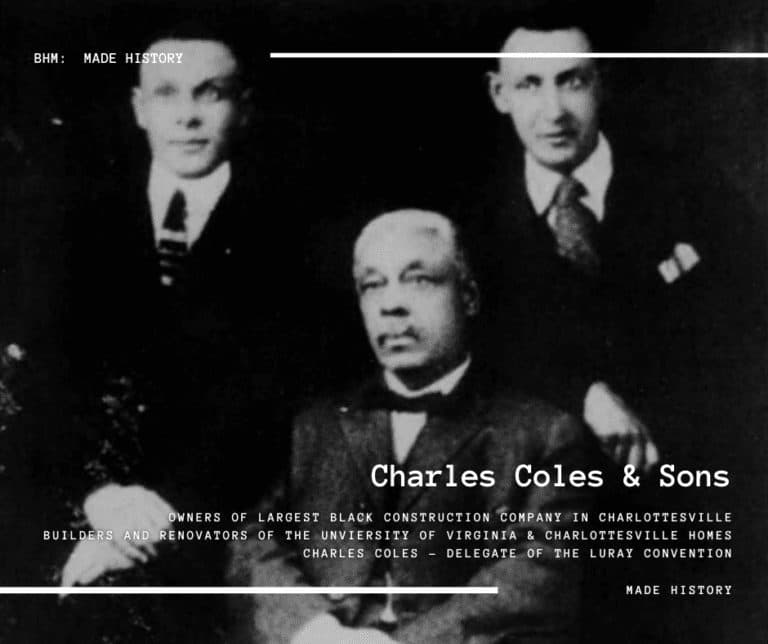
CHARLES COLES & SONS
Their company was the Charlottesville’s largest African-American owned construction business. Not only did they build homes, but they were hired by University of Virginia to make renovations.
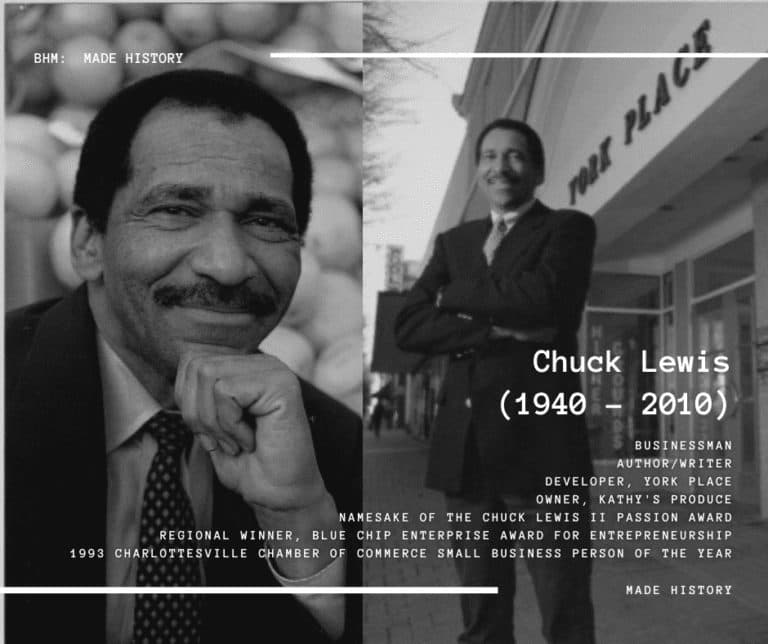
CHUCK LEWIS
One of Charlottesville’s leading businesspeople, the man credited with creating the first major wave of residences on the Downtown Mall, Chuck Lewis is remembered not only for putting people on the Mall but also for a rags-to-riches story that included founding a major local produce company.
Lewis grew up in a four-room house in the now-vanished African-American community of Quarlestown near Keswick, according to his autobiography. Book collaborator Amy Lemley tells how Lewis and his grandfather once dismantled their house, put it on a mule cart and reassembled it several miles away. Lemley also relates how Lewis remembered having to enter, during the Jim Crow era, the back door of the downtown Charlottesville building where his father worked as a short-order cook. Decades later, Lewis ended up buying that building, one of the six mixed-use Downtown Mall structures he would buy or build.
“He is someone who came out of some of the most meager circumstances that anyone could imagine,” says Lemley, who ticks off some of the careers with which Lewis experimented: Army paratrooper, motocross racer, quick-draw cowboy, bronco rider, model, theater cleaner, and birthday pony ride provider.
Lewis would go on to celebrate one of his heroes, York, the slave on the famed Lewis & Clark expedition, by naming one of the Downtown Mall buildings he developed York Place. Lewis hired architect R. Gerald Dixon to create a meandering center walkway in stone, an effort to visually portray the historic journey of the American west that Thomas Jefferson had commissioned.
Seen as one of the linchpin projects for Charlottesville’s core back when the Mall still seemed moribund, the upscale, mixed-use York Place–- with its 20 apartments and 11 retail spaces–- opened on November 30, 1995 and made Lewis the unrivaled residential developer downtown. At the time of his death, Lewis had 65 Mall apartments.
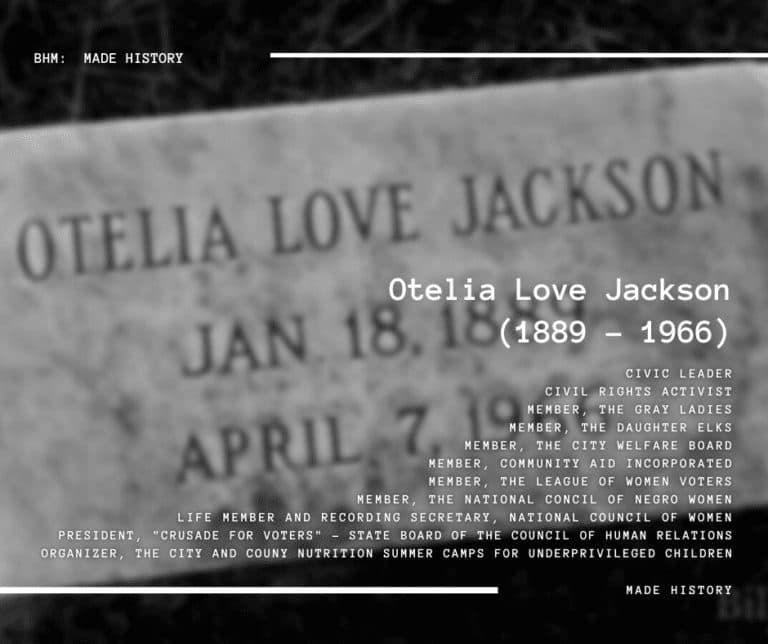
OTEILIA LOVE JACKSON
In 1959, many black voters were registered in Virginia largely due to the efforts of Otelia Love Jackson, and this was one of many civic efforts in which she was involved. She married Dr. John A. Jackson, a dentist, in December 1914, and bore seven children, all in their home in Charlottesville. Regardless of the large size of her family, however, she still had time to belong to numerous organizations, among which were the Gray Ladies during World War II, the City Welfare Board (served 18 years), the Daughter Elks, the League of Women Voters, the National Council of Negro Women, and Community Aid Incorporated. She helped to organize the City and County Nutrition Summer Camps for Underprivileged Children. Otelia Jackson also worked actively in the area of civil rights for blacks through her work on the State Board of the Council of Human Relations and as president of the “Crusade for Voters,” which was organized in 1959 in order to launch a statewide effort to register blacks to vote. She was a life member and recording secretary of the National Council of Women. Otelia Jackson died in 1966.
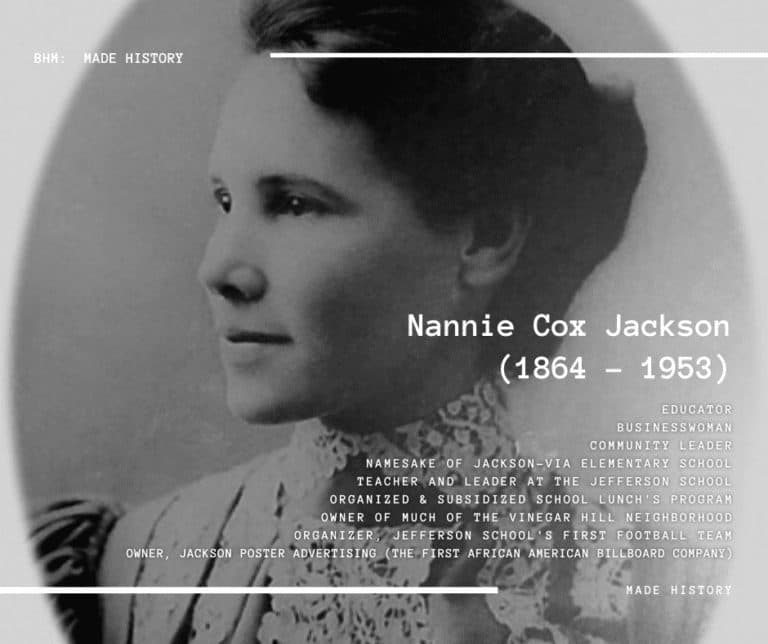
NANNIE COX JACKSON
The Jackson family lived at 520 Pearl Street in Charlottesville’s predominantly African-American neighborhood, Vinegar Hill. In 1939, white city officials intentionally destroyed the home and numerous other structures (including an African American Episcopal church) to construct the white-only Lane High School.[5]
A shrewd yet compassionate businesswoman, Jackson and her son W.E. “Billpost” Jackson Jr. owned Jackson Poster Advertising, the first African American-ran billboard company in the United States.[24] As one of Charlottesville’s largest property owners, Jackson owned close to 40 percent of the land in the predominately African-American neighborhood, Vinegar Hill. She regularly rented to other African Americans at reasonable rates.[4]
Because of Nannie Cox Jackson, many black children in Charlottesville were provided with school lunches, an athletic program, and for boys, the first (and last) all-boys domestic science class. Born in 1865 and the daughter of a black slave owned by Thomas Jefferson, Nannie Cox was a native of Charlottesville and was educated in public schools in Charlottesville and Washington, D.C. She began teaching at the secondary level at Jefferson High School as a domestic science teacher. While at Jefferson, she started the school lunch program. Approved but not financially supported by the school board, Nannie Cox Jackson prepared lunches which were sold to students for a few pennies, and those who could not afford to pay the small fee were allowed to work for their lunches. The school board later saw the value of this program and instituted such a program throughout the City of Charlottesville. Also, recognizing the need for an athletic program at Jefferson High School, Nannie Cox Jackson solicited money and supplies from local residents and equipped the high school’s first football team. She even located the coach on her own (a science teacher who coached the first team with the assistance of a local doctor), and she fed the team regularly after each football game from cafeteria funds. Later, the school board agreed to hire a part-time coach, but, unfortunately, no instructor for an all-boys domestic science class. Nannie Cox Jackson retired in 1939 after having taught in the Albemarle and Charlottesville school systems for more than fifty years. In 1969, a new school in the Charlottesville school system, Jackson-Via Elementary School, was named in her honor.
(Source) (Source) (Image Source)
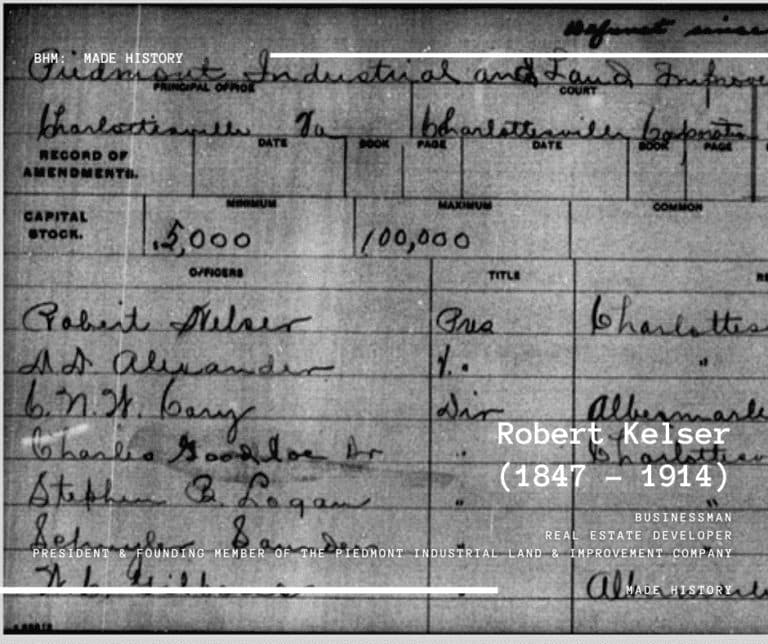
ROBERT KELSER
Robert Kelser (1847-1914, aged 57) [1] was president of an all-black development company, the Piedmont Industrial and Land Improvement Company, formed in 1889. Their goal was to assist Charlottesville area blacks in obtaining land ownership.
Formed in 1889, the Piedmont Industrial and Land Improvement Company was an all-black development company whose purpose was to buy and sell real estate as well as “to extend aide and assistance, financial or otherwise to persons of limited means in the purchasing of homes.” (Source: The Foster Site – National Park Service https://www.nps.gov/nr/feature/places/pdfs/16000259.pdf)
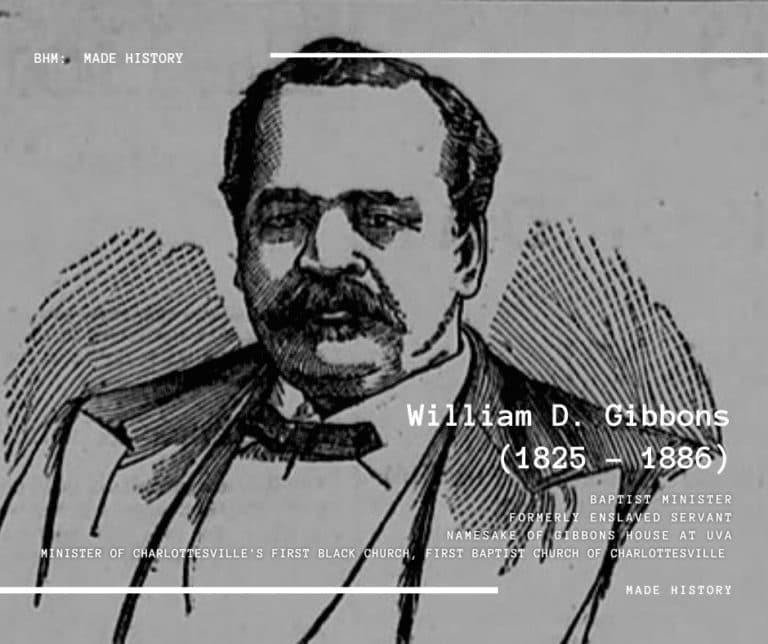
WILLIAM D. GIBBONS
William Gibbons (1825 – June 28, 1886), was a formerly enslaved servant, who became a highly successful Baptist minister in Charlottesville and Washington, D.C. He was married to Isabella Gibbons.
In 1867 he accepted a call to the pulpit at Charlottesville’s first Black church, the First Baptist Church of Charlottesville. As of early 1863, when the Emancipation Proclamation freed all the enslaved in Confederate territory, Black worshippers did not want any longer to be required to sit in the balcony of the First Baptist Church and to be outvoted routinely on issues of importance to them; they also felt that the minister discriminated against free blacks.[5]: 42–43 The Church split into Black and White congregations with the same name in the same building, although at first the Black church was required under Virginia law to have a White minister and white trustees, so the same minister led both congregations.[7] William was the church’s first Black minister,[5]: 48 after the Union military government made Virginia laws temporarily irrelevant.
The Black church soon acquired its own home, the former Delevan Hotel, and was for a few years the Delevan Baptist Church. The school in which Isabella taught was housed in the church basement.
(Source) (Image Source)
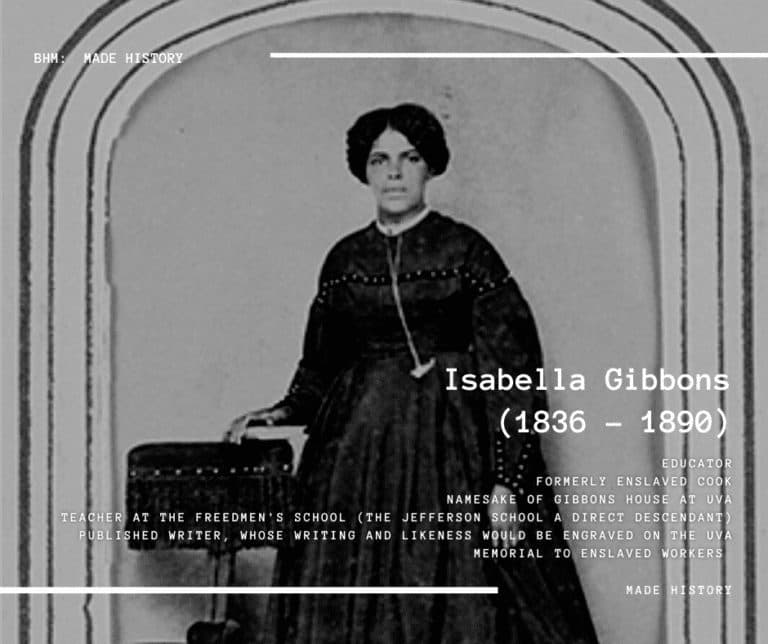
ISABELLA GIBBONS
Isabella Gibbons (c. 1836 – February 4, 1890) was an enslaved woman serving as a cook at the University of Virginia, in Charlottesville, Virginia. She and her husband were freed when General Philip Sheridan‘s troops reached Charlottesville, bringing the Emancipation Proclamation with them, on March 3, 1865 (see Liberation and Freedom Day). She became a teacher at the Freedmen’s School; its direct descendant is the Jefferson School.
In 2015, the University of Virginia named its new residence hall Gibbons House, in honor of Isabella and William. In the public area are photos of them, interpretive panels on the walls, and a plaque about them.[1] Isabella’s eyes, based on the above photograph, as there is no other, and the quote cited below, are inscribed on the exterior of the Memorial to Enslaved Laborers:
Can we forget the crack of the whip, cowhide, whipping-post, the auction-block, the hand-cuffs, the [manacles], the iron collar, the negro-trader tearing the young child from its mother’s breast as a whelp from the lioness? Have we forgotten that by those horrible cruelties, hundreds of our race have been killed? No, we have not, nor ever will.
(Source) (Image Source)
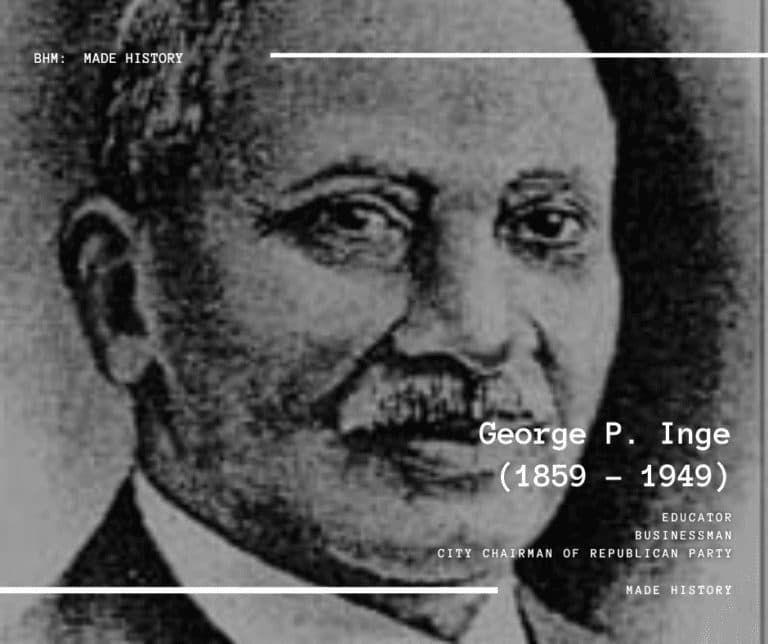
GEORGE P. INGE
George P. Inge was a teacher at the Jefferson School for two years before opening a grocery store at 333 West Main Street. In 1900, he was elected City Chairman of the Charlottesville Republican Party. He was part of the Cox delegation dismissed from the Luray Convention in 1922. He was quoted to have said that he aimed “to live an upright life and do all I can to better the condition of my fellow man who may not be so well favored.”
Inge was known to be a close confidant of Paul McIntire and is said to be instrumental in the donation of the property for Washington Park. Booker T.Washington had attended school with Inge and their friendship continued through the years, with Washington staying with the Inge’s when he visited Charlottesville.[5]
As the Vinegar Hill area developed into an African-American business and residential district, Inge’s grocery stood at its center as an important commercial and social establishment. For a time, Inge’s Store was the only place in Charlottesville to sell fresh fish.[4] Inge’s supplied the Clermont and Gleason Hotels, the Dolly Madison Inn, and the University Hospital, as well as fraternities and private homes.[4] In 2004 the City of Charlottesville unveiled a historical marker in front of the 333 West Main Street location honoring the significance of Inge’s Grocery.[4]
Making History
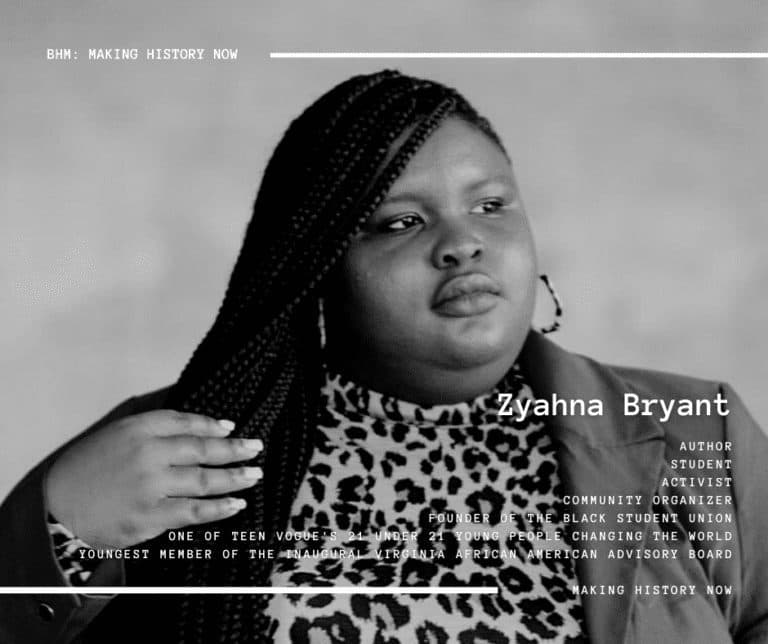
ZYAHNA BRYANT
Student activist and community organizer, Zyahna Bryant, has been a champion for racial justice in Charlottesville since the young age of 12, when she organized her first demonstration, a rally for Justice for Trayvon Martin and other unarmed black lives lost to police violence. She’s been a leader of change for many local organizations and has been led by her primary focus of closing the achievement gap and providing equal access for students of color. She has been featured in The New York Times, National Geographic, The New Yorker Magazine, CNN, and Vice News, and was named as one of Teen Vogue’s 21 under 21 Young People Changing the World.
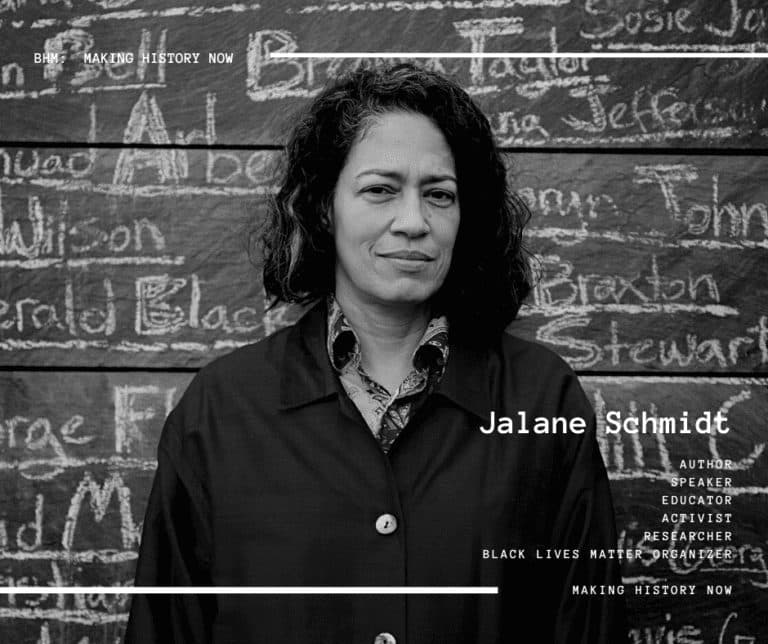
JALANE SCHMIDT
Jalane Schmidt is Associate Professor of Religious Studies at the University of Virginia, where she teaches classes on Latin American, Caribbean, and African diaspora religions. For years, she has conducted field research and archival research in Cuba, and she is the author of “Cachita’s Streets: The Virgin of Charity, Race and Revolution in Cuba” (Duke UP, 2015). She also teaches classes on critical whiteness studies and religion, and on social movements.
She is an organizer with the Charlottesville chapter of Black Lives Matter. She has appeared in numerous national and international news outlets, and frequently speaks to audiences about whiteness, white supremacy, policing, and affordable housing.
Schmidt has been active since 2016 in the local struggle to rid Charlottesville of its Confederate monuments, and during the 2017 #SummerOfHate, she helped organize counter-demonstrations against white supremacist rallies in Charlottesville.
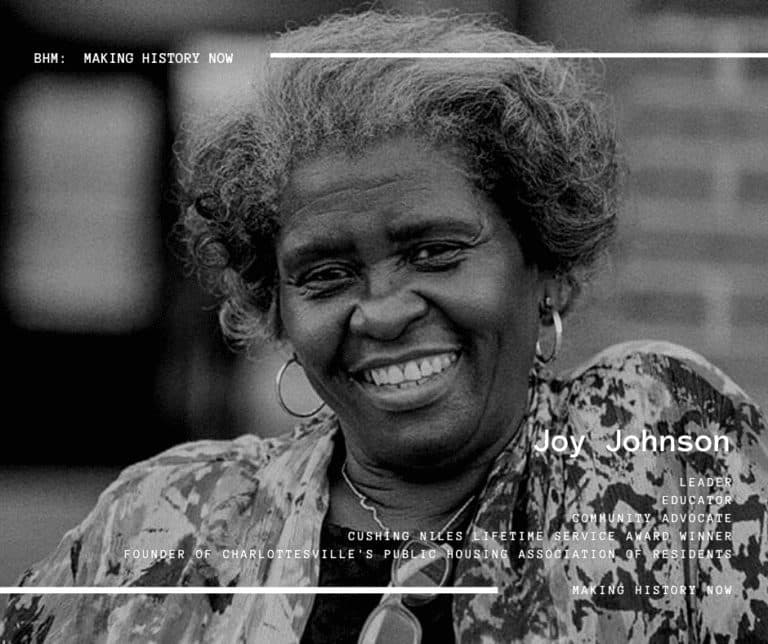
JOY JOHNSON
Joy Johnson is the founder and board chair of Charlottesville’s Public Housing Association of Residents and has been an advocate for community members and housing policies and practices. Johnson was awarded the Cushing Niles Dolbeare Lifetime Service Award from the National Low Income Housing Coalition in 2021. She was recognized for decades of work and achievement in her advocacy for residents of low-income and public housing, always putting the rights and needs of residents front and center, giving them influence in the city’s planning and policy decisions which impact the lives of others in their community.
Johnson has served on or chaired numerous boards and commissions, including:
Head Start Policy Council,
CRHA Board of Commissioners,
UVA Employee Council,
Virginia Association of Neighborhoods,
Offender Aid and Restoration Board,
Westhaven Tenant Association,
and many others.
“In the early 2000s, Joy served on the board of NLIHC, bringing her phenomenal activist-leadership to the work of the Coalition. Joy is currently the vice president of the Board of Legal Aid Justice Center and serves on the Local Steering Committee of the Equity Center at the UVA Housing Committee, the CRHA Redevelopment Committee, the UVA Billing and Collections Advisory Council, PHAR’s Residents for Respectful Research Advisory Committee, and the Charlottesville Housing Advisory Committee. Joy also works with JR Fleming of the Chicago Anti-Eviction Campaign.” (via Charlottesville Tomorrow)
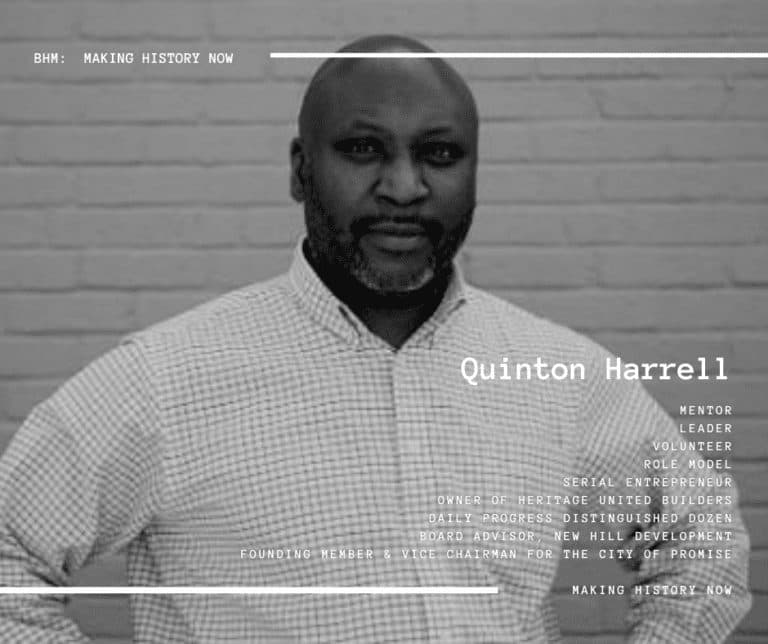
QUINTON HARRELL
Quinton Harrell is a self-described “serial entrepreneur,” who considers his most important job as “serving for House Harrell with the lovely and effervescent Yolunda Harrell, who serves as CEO.” He owns a company called Heritage United Builders, which has a mission to connect minority and African American subcontractors to construction work in the Charlottesville area. He is also a real estate developer with his wife through their organization New Hill Development. He says these businesses help him serve what he calls his family mission, which is to “expand our blessings so that we may be a blessing to others.”
He has served as a founding member and vice chairman for the City of Promise and also served on Charlottesville’s Citizens Advisory Panel for the Chief of Police. A past Boys & Girls Club volunteer, Big Brother Big Sister mentor, and work group leader for the Community Investment Collaborative, a local entrepreneur incubator; Quinton currently serves as a contributing committee member for the Charlottesville Alliance for Black Male Achievement and vice president of the Black Professionals Network. Quinton currently co-owns A Taste of Home Southern Cuisine, a food truck and catering business, with his wife Yolunda
Quinton believes even though race and racism continue to cultivate and promulgate systemic hurdles and hindrances for African Americans, economic empowerment, financial literacy, spiritual and wealth building strategies are the critical counterbalances and compliments to social justice activism.
When asking him what legacy he’d like to leave on Charlottesville, Harrell said, “That we’ve lived our mission authentically, unapologetically, and that we’ve actually, truly created value for the African American community. That we change lives. If we create value for the African American community that changes lives, a new paradigm of wealth building opportunities will have been made for African Americans in this community. We believe that when that happens, it benefits the entire community.”
The Daily Progress made him one of their Distinguished Dozen in 2016.
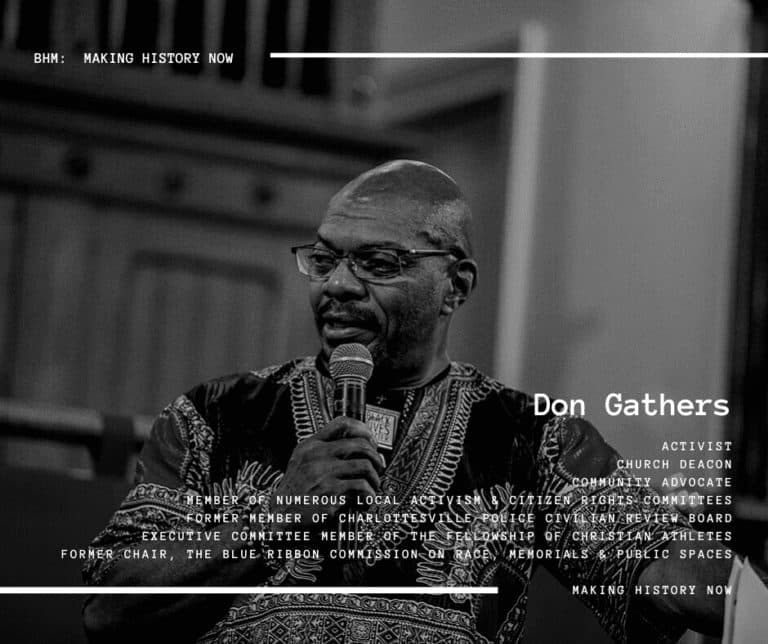
DON GATHERS
Don Gathers is a self-described “concerned citizen, who sees things that don’t always seem to fit the puzzle properly, and it doesn’t sit well. And for whatever reason, when that happens, I feel compelled to speak on it.” That may be putting it a little humbly, though. Gathers is a local activist who has been profiled by many news organizations and is a leader of change throughout the community in various organizations. He served on the original Police Civilian Review Board, is former Chair of the Blue Ribbon Commission on Race, Memorials & Public Spaces, an Executive Committee Member of the Fellowship of Christian Athletes at UVA and a member of numerous local activism and citizens’ rights committees.
“Sometimes a voice in the wilderness is what’s needed. Sometimes a foot on the pavement is what’s needed. Sometimes a presence in a meeting is what’s needed. But whatever it is, I think it’s imperative and incumbent upon us to do whatever is needed for the time,” said Gathers.
“I would urge everyone to do whatever they are comfortable doing. Not everyone can go to a public forum meeting and stand up and speak in front of everyone. Not everyone can go out on the streets and protest or march. Not everyone can write a letter to the editor. But everyone can do something. It’s just a matter of figuring out what that ‘something’ is for everyone to do.”
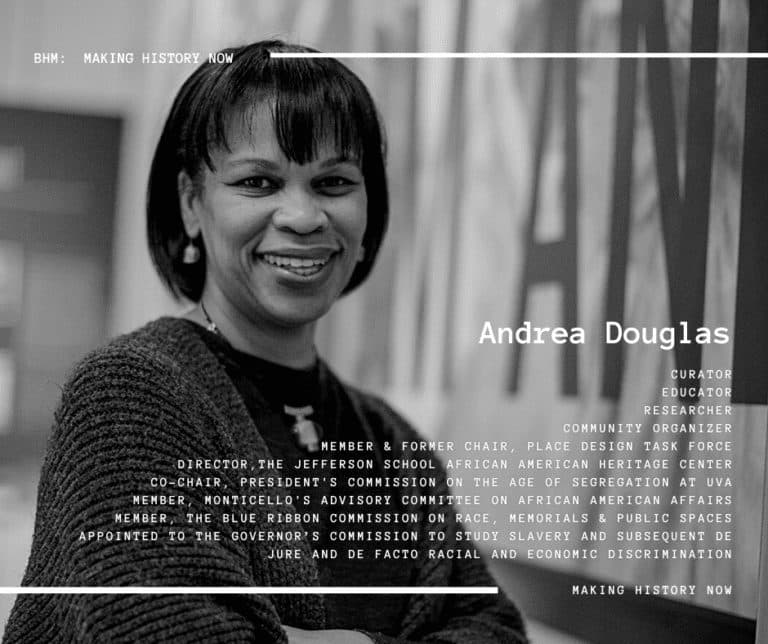
ANDREA DOUGLAS
Dr. Andrea Douglas is director of the Jefferson School African American Heritage Center. She is also a member of the PLACE Design Task Force. Douglas holds an M.A. and Ph.D. in art history from the University of Virginia and an M.B.A. in arts management and finance from Binghamton University, NY. Douglas has taught graduate and undergraduate classes in African American, contemporary, and art theory, and has published exhibition catalogues and scholarly articles. From 2004 – 2010 she was Curator of Collections and Exhibitions and Curator of Contemporary Art at the University of Virginia Art Museum.
When asking her about her tenure at the Jefferson School, Douglas told us that she’d been with this project since 2007, first on the advisory board initially, and then in 2011, became the Executive Director to lead it to its opening in 2013. “This is our 9th year in existence in the city. We’re the only institution that does what we do in the way that we do it, by deliberately focusing on the history and production only of African American people and trying to make relationships between our local history and the larger histories and how that defines an American culture.”
“One of the things we are trying to do is reduce the distance between the past and the present, and a lot of that is present in the landscape. We spend a lot of time not just thinking about the work we do inside, but how that reflects itself in the landscape. There’s a lot of emphasis here on, for instance, Vinegar Hill as a locating point, but what we try to do is describe the much longer history of Black property ownership and community making that dates back to the 18th century. This is not a 20th century iteration. Some of work in that way means that we are engaged in a preservation conversation, meaning that by pointing out what remains, as opposed to what has been lost, we have been able to construct a broader space for Black people in this community, and how that then reflects the development of Charlottesville,” said Douglas.
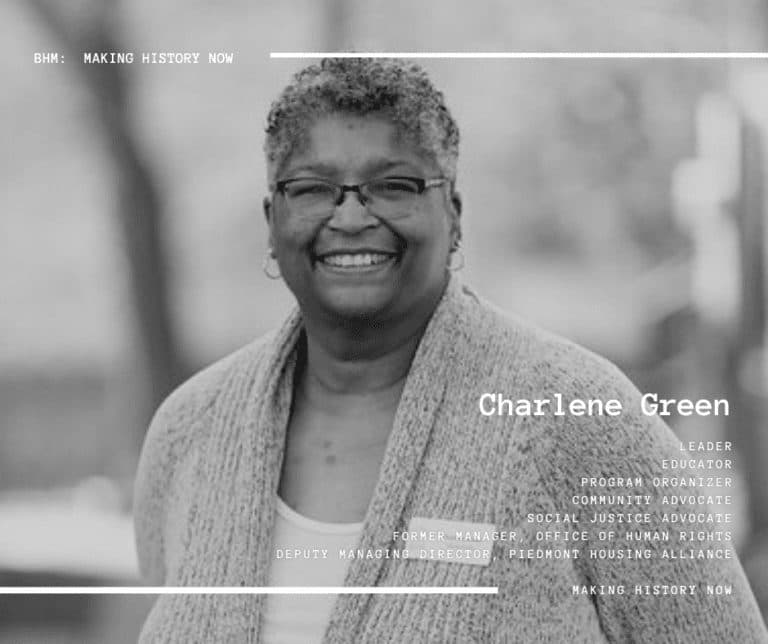
CHARLENE GREEN
Charlene Green currently serves as the Deputy Director of the Piedmont Housing Alliance. Green is known throughout Charlottesville and the surrounding region for her inspiring dedication to educating the community on the local history of race and institutional power, including the destruction of Vinegar Hill and the role of confederate statues in our parks.
Prior to her stepping into the role of Deputy Director in 2020, she was a leader in multiple roles in Charlottesville, including the city of Charlottesville’s Office of Human Rights, where she served as manager. She has created and strengthened many diversity, equity and inclusion programs within educational institutions including the University of Virginia, the Albemarle County School system, and the city at large. She was also the organizer of Unity Days.
Her focus has been community related work with an emphasis on housing and social justice.
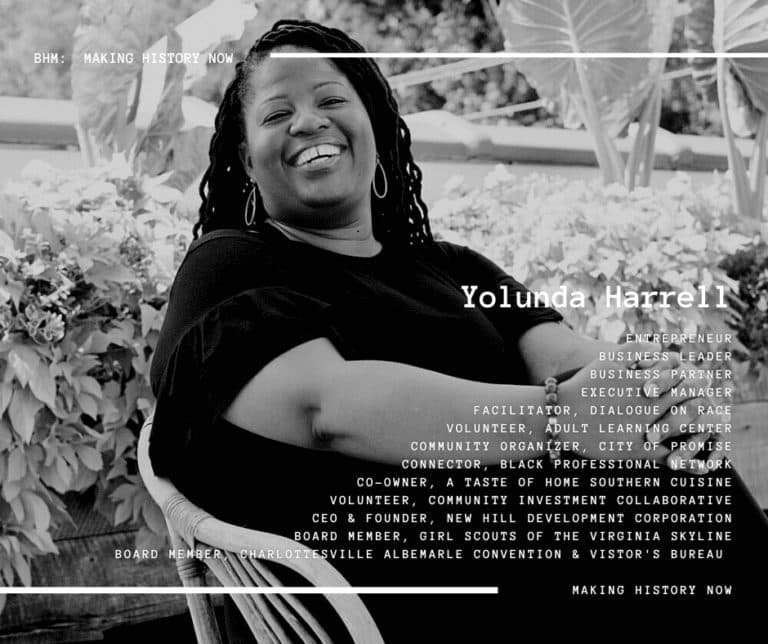
YOLUNDA HARRELL
Yolunda Harrell has worked, served, and lived in the Charlottesville area for the last 13 years. Yolunda is a Christian, wife, business partner, executive manager, entrepreneur and CEO and Founder of New Hill Development Corporation.
Since living in Charlottesville, Yolunda has endeavored to contribute positively to the fabric of what is deemed as “community” by: volunteering as a GED tutor for the Adult Learning Center, acting as a facilitator for Dialogue on Race, community organizing for the City of Promise, and helping to create a social networking organization to connect African Americans in Charlottesville known as the Black Professional Network to name a few. Yolunda also decided to return to college to get her Bachelor’s degree in Business Administration while also participating in and volunteering for an entrepreneur development program known as Community Investment Collaborative which led to the development of her co-owned business, A Taste of Home Southern Cuisine; a food truck and catering business. Yolunda’s desire to work more effectively in her community led to her participation Board Development Academy through the Center for Non-Profit Excellence. Upon completion of her board training Yolunda began serving on the board of Girl Scouts of the Virginia Skyline, Charlottesville Albemarle Convention and Visitor’s Bureau, and BPN. Yolunda was raised to believe in the Golden Rule, to seek to give more than you seek to receive, and to bring forth thoughtful solutions to challenging opportunities. These values are what drive her vision and her purpose.
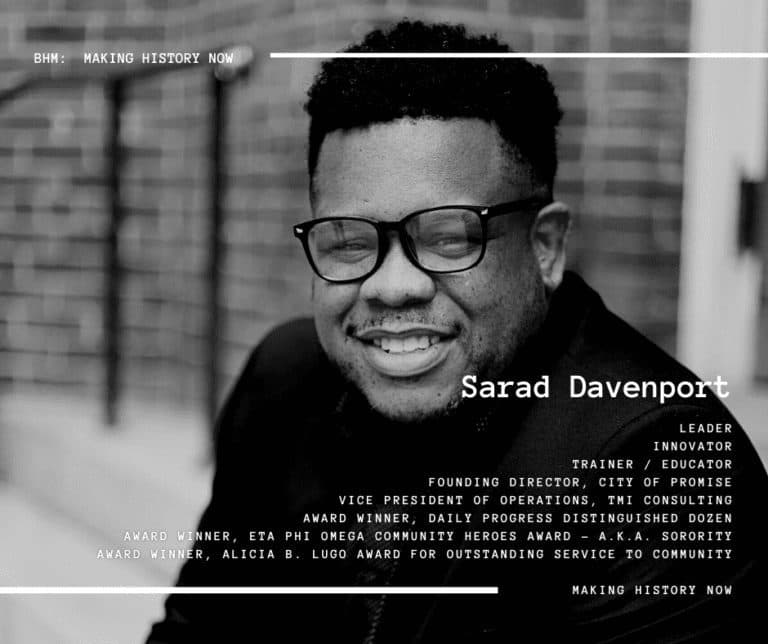
SARAD DAVENPORT
Sarad has a long history of working with marginalized communities in the educational, professional and community settings using asset-based community development practices. Prior to joining TMI Consulting, Sarad served as Principal for Organizational Health & Performance where he co-led the DEI Data and Research working group and also developed the DEI electronic assessment tool. Sarad served for two years on the Health & Economic Mobility policy group at the Brookings Institute in Washington, DC with a group of professionals seeking to make population level change at the intersection of health and economic mobility. In addition to that, Sarad co-lead collective impact work with national partners, Strive Together and the Coalition for Community Schools in communities across the country. Prior to working at the national level, Sarad served as the founding director of the Charlottesville Promise Neighborhood, also known as City of Promise, a federal planning grant recipient. Sarad spent more than five years working with key stakeholders to build City of Promise into a sustainable and outcomes-driven organization focused on improving life-outcomes for youth and families in Charlottesville.
Awards
Distinguished Dozen Award – Daily Progress, Central Virginia Newspaper Leader Award,
Alpha Kappa Alpha Sorority, Inc. Epoch Awards, Eta Phi Omega Community Heroes Award, 2015
Alicia B. Lugo Award for Outstanding Service to Community, 2014
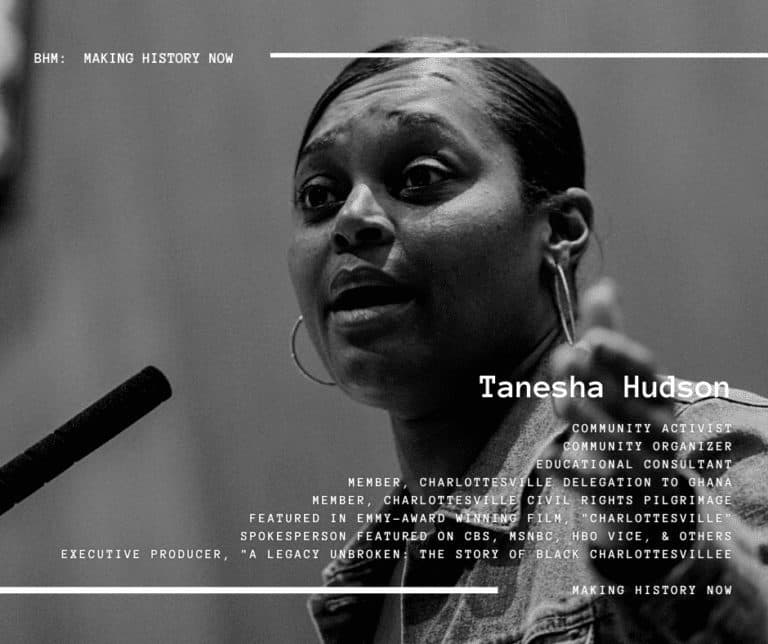
TANESHA HUDSON
Filmmaker Tanesha Hudson is a community activist, organizer and educational consultant from Charlottesville who works to center the voices of marginalized communities in historical narratives. Tanesha is featured in the Emmy award-winning documentary Charlottesville and has been interviewed by CBS, MSNBC, HBO Vice, and other national and international news outlets. In 2018 she was a member of both the Charlottesville delegation to Ghana and the Charlottesville Civil Rights Pilgrimage.
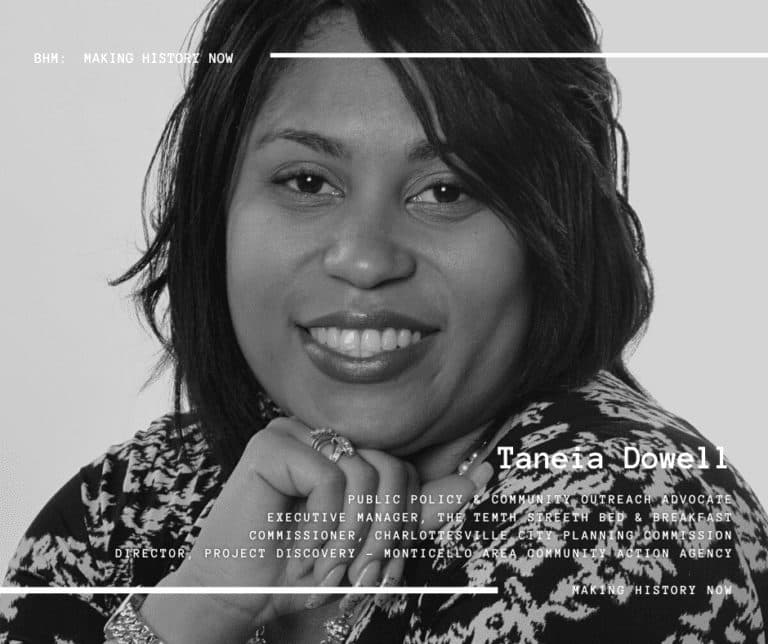
TANEIA DOWELL
Taneia Dowell, local activist and educator, serves as the Project Discovery Director for the Monticello Area Community Action Agency. She has been with Head Start for several years, where she first was a parent and Policy Council representative, and then joined the staff as an Assistant Teacher, where she excelled. Next, Taneia moved to the position of Family Advocate and was very successful in that role. When the Project Discovery position came open, it was a natural fit for Taneia, as she had worked with teens in the public schools in a previous job.
Dowell has been active in the community and a voice for the underrepresented in many public forums and has worked to educate others on ways Charlottesville can improve its diversity, equity and inclusion.
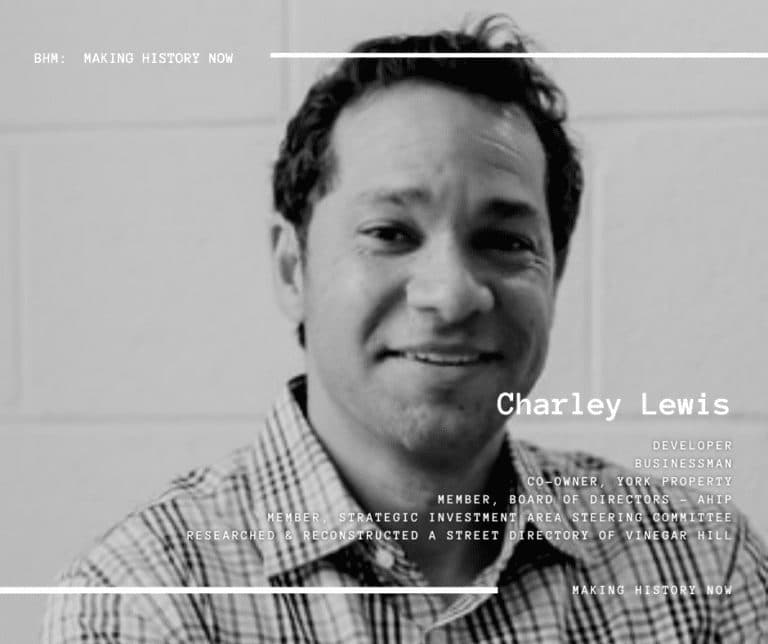
CHARLEY LEWIS
Charles “Charley” Lewis is a Charlottesville businessman and property owner. He is the son of Chuck Lewis. Together with his sister Leah, he owns York Property.[1]
Lewis served on the Strategic Investment Area Steering Committee.[2] In 2017, Lewis surveyed older residents to reconstruct a street directory of Vinegar Hill, finding nearly 50 businesses and their addresses.[3]
Lewis serves on the Board of Directors for the Albemarle Housing Improvement Program (AHIP), a 46 year old institution. Their mission is to ensure safe, affordable homes for neighbors in need.